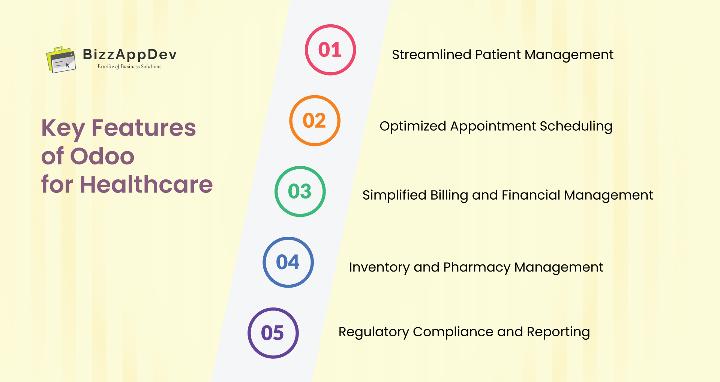Introduction: Why Odoo in Healthcare is Gaining Global Attention
Healthcare is one of the most complex industries in the world. Hospitals, clinics, and healthcare startups deal with challenges like patient record management, billing errors, compliance with government regulations, and lack of integration between departments. These challenges not only slow down operations but also affect patient care.
This is where Odoo in healthcare is making a difference. With its all-in-one ERP platform, Odoo helps healthcare providers streamline workflows, improve compliance, and focus on what matters most, patients.
Why Healthcare Facilities Need Odoo ERP
Healthcare organizations encounter unique challenges, including regulatory compliance, rising operational costs, and the need for a seamless patient experience. Implementing a robust Healthcare ERP system like Odoo helps address these challenges by:
- Reducing operational inefficiencies.
- Streamlining administrative tasks.
- Enhancing patient care and engagement.
- Maintaining accurate, real-time data for decision-making.
Benefits of Healthcare ERP Implementation
- Centralized patient records: Ensure accurate, real-time data for all patient interactions.
- Automated billing & invoicing: Reduce errors and administrative workload.
- Inventory & supply management: Track medical supplies and optimize procurement.
- Regulatory compliance: Adhere to healthcare laws and standards with automated reporting.
- Enhanced patient experience: Reduce waiting times and improve communication.
Key Features of Odoo for Healthcare
1. Streamlined Patient Management
Odoo allows hospitals to manage patient data efficiently, offering:
- Digital patient records accessible across departments.
- Integrated treatment plans for doctors and nurses.
- Quick retrieval of medical history to enhance care quality.
2. Optimized Appointment Scheduling
Efficient scheduling reduces wait times and improves resource utilization:
- Automated appointment reminders.
- Integration with doctor availability and hospital facilities.
- Minimizes scheduling conflicts.
3. Simplified Billing and Financial Management
Billing errors can be costly. Odoo ensures accurate financial management:
- Insurance claim processing and tracking.
- Transparent billing for patients.
- Integration with accounting modules for real-time updates.
4. Inventory and Pharmacy Management
Odoo helps hospitals maintain optimal inventory levels:
- Automated stock tracking for medicines and supplies.
- Alerts for low-stock items.
- Efficient procurement management.
5. Regulatory Compliance and Reporting
Healthcare compliance is non-negotiable. Odoo ensures adherence to regulations:
- Automated compliance checklists.
- Audit-ready reports.
- Secure data storage meeting international standards.
Comparison Table – Healthcare Before vs. After Odoo
Feature | Before Odoo | After Odoo Implementation |
Patient Records | Paper/Excel-based | Centralized digital records |
Billing & Insurance | Frequent errors | Automated & accurate |
Compliance | Manual reporting | Automated reports, GDPR-ready |
Inventory Management | Stock-outs, wastage | Real-time tracking & automation |
Staff Management | Manual scheduling | Smart HR integration |
Enhancing Patient Experience Through Odoo ERP
Patient satisfaction is crucial for any healthcare facility. Odoo contributes to a better patient experience by:
- Reducing wait times with digital scheduling.
- Providing seamless communication between patients and healthcare staff.
- Enabling personalized care with centralized patient records.
- Offering online portals for appointment booking and bill payment.
Reducing Operational Costs in Healthcare with Odoo
One of the biggest benefits of Odoo ERP is cost efficiency. Hospitals can:
- Minimize manual administrative tasks.
- Reduce errors in billing and inventory management.
- Optimize staff allocation and resource usage.
- Leverage data-driven decisions to cut unnecessary expenses.
Healthcare Compliance Management Software
Regulatory compliance is non-negotiable. Hospitals must adhere to standards such as HIPAA, GDPR, and local healthcare regulations. Odoo’s compliance management tools help:
- Generate automated audit reports.
- Monitor adherence to treatment protocols.
- Maintain secure patient data with controlled access.
- Track medication administration and inventory for safety.
Case Studies: Odoo ERP in Healthcare Sector
Case Study 1: Multi-Specialty Hospital in Europe
A European multi-specialty hospital implemented Odoo integration across departments. Key outcomes:
- 30% reduction in patient wait times.
- 25% improvement in billing accuracy.
- Real-time reporting for compliance audits.
Case Study 2: Private Clinic in India
A private clinic adopted Odoo customization for patient management and pharmacy operations:
- 40% increase in appointment efficiency.
- Reduced medicine wastage by 20%.
- Streamlined insurance claim process.
Steps to Successful Odoo Implementation in Healthcare
- Assessment: Analyze existing workflows and pain points.
- Customization: Tailor Odoo modules to meet hospital-specific needs.
- Integration: Connect Odoo with existing systems and devices.
- Training: Educate staff on using the platform effectively.
- Monitoring & Optimization: Regularly track KPIs and improve processes.
Recommended Modules for Hospitals
Odoo CRM: Manage patient interactions and follow-ups.
Odoo Accounting: Track finances and billing.
Odoo Inventory: Optimize pharmacy and supply chain.
Odoo HR: Manage hospital staff efficiently.
FAQs on Odoo for Healthcare
Q1: Can Odoo ERP handle large hospital networks?
Yes, Odoo is highly scalable and can manage multiple facilities with centralized data.
Q2: How does Odoo improve compliance in healthcare?
Through automated reporting, audit trails, and secure data management.
Q3: Is Odoo suitable for small clinics?
Absolutely. Odoo’s modular design allows customization based on the facility size.
Q4: Can Odoo integrate with existing healthcare software?
Yes, Odoo integration capabilities allow seamless connection with other hospital systems.
Conclusion
Implementing Odoo for healthcare empowers hospitals and clinics to streamline operations, ensure compliance, and deliver exceptional patient experiences. Whether you manage a small clinic or a large hospital network, Odoo’s modular, scalable, and user-friendly ERP solution can transform your healthcare operations.
Ready to optimize your healthcare facility? Explore Odoo ERP today, request a demo, and experience the future of hospital management firsthand.
Ready to optimize your healthcare facility?
Explore Odoo ERP today, request a demo, and experience the future of hospital management firsthand.
